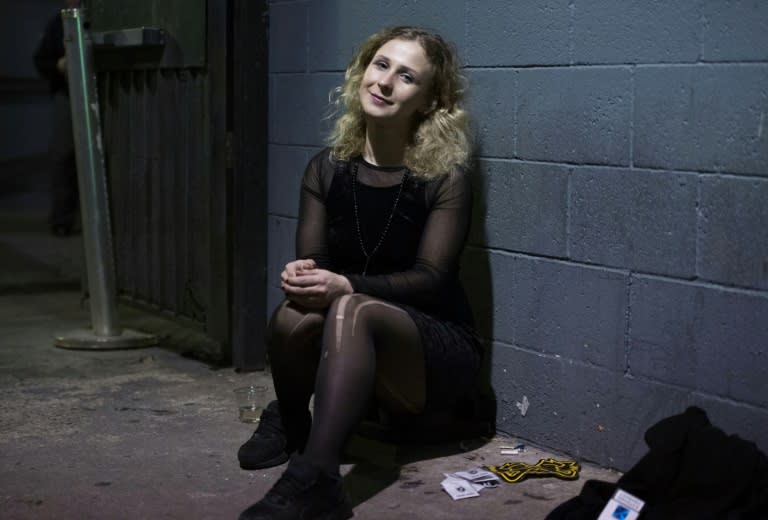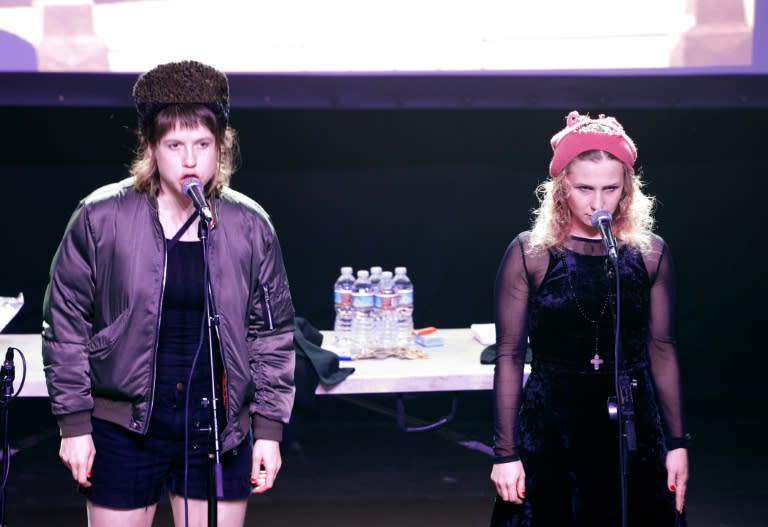Pussy Riot declare new revolution from the stage
Still relishing provocation three years after their release from a Russian prison, the punk rockers Pussy Riot are reviving their challenge to President Vladimir Putin in an action-packed autobiographical theatrical piece. Maria Alyokhina, one of two key members of the group who went to prison, has taken Pussy Riot in a new avant-garde direction in an hour-long performance called "Revolution" that merges punk, electronica, theater, documentary footage and plenty of snide references to Putin. Characterized by Alyokhina as a "living book," the piece is based on a memoir she will publish later this year. It kicks off with an allusion to Russia's Bolshevik takeover 100 years ago and a rhetorical question about whether her piece is about that revolution. "No, the one that's happening now!" Alyokhina shouts in unison with actor Kiryl Kanstantsinau before embarking on an frenetic account of the feminist collective since its founding in 2011. Alyokhina and fellow member Nadezhda Tolokonnikova were charged with hooliganism after they sneaked into a cathedral near the Kremlin and -- for less than a minute -- performed a "punk prayer" against Putin. If Pussy Riot was about shock tactics, Alyokhina in "Revolution" explains the intellectual underpinnings. Putin, the piece charges, had been transforming himself into an emperor through fraudulent elections. The Russian Orthodox Church, she charges, had become "servants of the tsar" with little to do besides selling "elite porcelain eggs and replicas of imperial-era medals." Pussy Riot casts itself a part of the history of revolution. Screen images shift from Eugene Delacroix's painting "Liberty Leading the People," the goddess triumphantly raising the French tricolor, to footage of Pussy Riot rising in Red Square to sing "Putin Has Pissed His Pants." - Taking 'Revolution' to Russia - Pussy Riot's music, which earlier had the blunt force of punk, becomes more rhythmic and intense in "Revolution." The music takes on the edge of digital hardcore groups such as Atari Teenage Riot as Pussy Riot teams up with the Russian duo Asian Women on the Telephone, whose saxophonist Nastya exhales from deep in her lungs over an energetic electronic backdrop. Alyokhina, 28, relives her detention in a penal colony in the Ural Mountains, where she recounts being disciplined for waking up at 5:45 am instead of 5:20 am and going on a hunger strike to protest her conditions. She ends the piece with a warning that freedom does not exist on its own -- "Fight for it every day!" As part of her defiance, Alyokhina said she plans to perform "Revolution" in Russia shortly and is not thinking about the consequences. "We are living in the country where the secret service is ruling... for 100 years," she said after the New York premiere of "Revolution" Friday at the National Sawdust experimental music venue. "I think we shouldn't play chess with them because they will win for sure," she said. "What we can do is to be ourselves, believe in what we are doing, and love what we are doing." - Complacency in US - "Revolution," which earlier toured the US West Coast, comes as Putin has risen to the forefront of US political discourse. US intelligence agencies have accused Russia of meddling in the November election, in which Donald Trump pulled off an upset victory. In a subtle nod to US protesters, Alyokhina took the stage in a trademark Pussy Riot balaclava before folding it back as if to represent cat ears -- an emblem of feminist opponents of Trump, who famously boasted of getting away with grabbing women "by the pussy." Pussy Riot bandmate Tolokonnikova has recently gone in a different direction by turning her gaze on US rather than Russian politics. In a song and video before the election called "Make America Great Again" after Trump's slogan, Tolokonnikova imagined a dystopian world under the tycoon's reign with women branded like cattle. Alyokhina was less animated about Trump, attributing his election to complacency under former president Barack Obama. "People just kind of relaxed and thought or felt that what they had was forever," she said. To Americans fearing a dire erosion of freedoms under Trump, Alyokhina suggested looking at her experience in Russia to compare. "When you have something for a long time, you sometimes forget that you have it, actually," she said. "And you start to be really snobbish and critique and say, 'We're not free!' and so on. But come on!"





